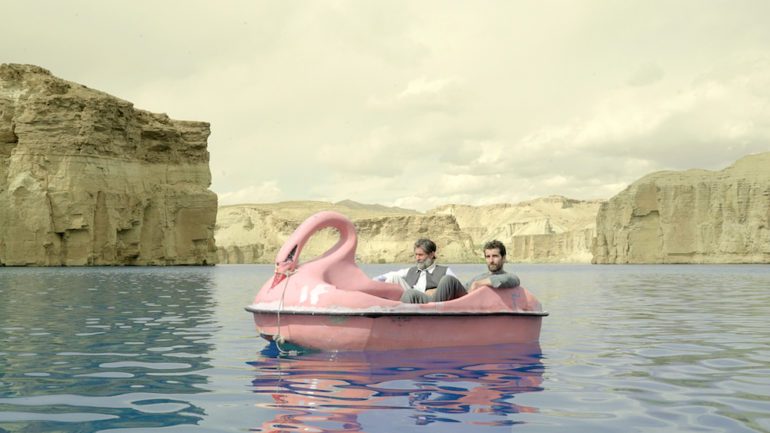Film Review: ‘Jirga’
By Eddie Cockrell
LOS ANGELES (Variety.com) – Buried within the closing crawl of writer, director, cinematographer and co-producer Benjamin Gilmour’s unfortunately cryptic but nonetheless fascinating debut film “Jirga” are shout-outs for security, political and cultural liaisons, as well as an Afghan film advisor. These credits speak, however quietly, to the no-doubt-delicate and clearly arduous making of a film that finds a guilt-ridden Australian soldier returning to Afghanistan three years after mistakenly killing a married father during a village raid to make monetary amends to his widow and orphaned sons, only to be waylaid by a small, cave-dwelling Taliban squad along the barren route.
Warmly received on the festival circuit — almost certainly as much for its spectacular scenery as the frustrating wisp of a plot — “” (which means “a tribal council” in the film’s predominant Pashto language) has emerged as Australia’s official entry for the Oscar foreign language race as well as the winner of the newly-created “best indie film” at the not-for-profit AACTA (Australian Academy) Awards.
Anxious bordering on paranoid, Mike Wheeler (Sam Smith) arrives in Kabul three years after a brief prologue in which he’s seen in uniform during an apparent raid on a village. Acquiring local clothes and an unwanted guitar, he checks in to a small hotel and immediately unwraps and hides five paperbound bundles of American $100 bills hidden around his mid-section.
After being unceremoniously brushed off in a market by his pre-arranged contact Colonel Rafiq (Mohammed Shah Majroh), Wheeler arranges with the hotel’s receptionist (Naqibullah Khan Shinwari) to hire a private taxi driver (Sher Alam Miskeen Ustad). Their destination? South, toward Kandahar.
Along the way, Mike and his unnamed yet affable escort bond, after a fashion, by singing, playing instruments and, improbably, paddling around a massive and deserted lake in a faded pink boat shaped like a swan. The next day, they’re accosted by a small group of Taliban, and Mike, under fire, escapes into the rocky and barren landscape, where he passes out.
At this point, nearly halfway through the trim 78-minute running time, audiences have been given no indication what Mike intends to do with all that money — or, honestly, why he’s in Afghanistan at all. His motive becomes clear only after he’s interrogated by the five-man Taliban squad, who drag him to, and shackle him against the wall of, their cave hideout.
With the helpful translation of Amir (Amir Shal Talash, who does quadruple duty as actor, local producer, one of two casting directors, and the film’s first AD), Mike explains to leader Sher Khan (Basheer Safi) that he wants to find the murdered man’s family. Not knowing what to make of this unexpected foreigner and his bold yet clearly naïve mission, the squad debate his fate.
It gives away nothing to reveal that Mike ends up presenting himself to the grief-stricken widow Sherbano (Arzo Weda) and stern-looking eldest son (Inam Khan), who is designated by the tribal elders via Jirga to ultimately decide the interloper’s fate.
Gilmour spends much time on the details of Afghan life, from marketplace stalls and local shops to teatime and even a thunderstorm at dusk. His lensing is crystalline, with mountainous locations emphasizing the stark and unforgiving beauty of the land as well as the strength of those who inhabit it.
As interesting as all this is, and as challenging and perilous it must have been to capture these images, “Jirga’s” elliptical approach to plot and selective use of subtitles does the finished product no favors (few characters are named, for example, with “Wheeler” appearing only in the cast list). In vividly evoking the fish-out-of-water panic of an apparently honest man on a quest both noble and risky, Gilmour and his troupe have themselves taken on a tricky narrative task.

